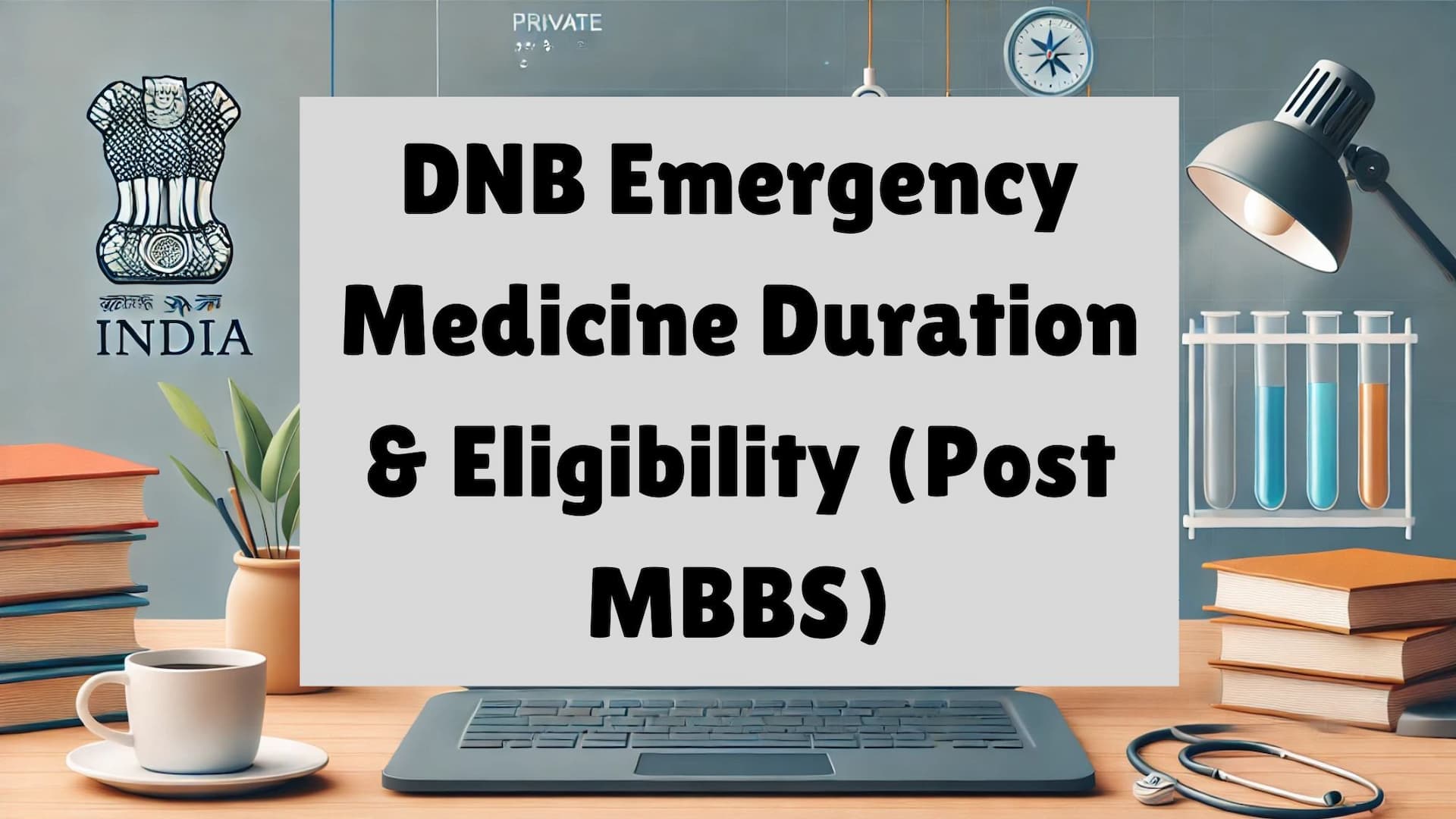Government Medical College Handwara receives NBE accreditation for its DNB Emergency Medicine programme
The Diplomate of National Board (DNB) in Emergency Medicine is a highly sought-after postgraduate course recognized by the NBEMS. This comprehensive program has a duration of three years for candidates joining after their MBBS degree. To be eligible, candidates must possess a recognized MBBS degree, complete the mandatory one-year rotating internship, and hold a valid permanent registration certificate from the NMC/SMC. Admission to this specialty is strictly merit-based, requiring candidates to qualify in the National Eligibility-cum-Entrance Test Postgraduate (NEET-PG) examination.

The DNB (Diplomate of National Board) in Emergency Medicine is a structured and rigorous postgraduate training program administered by the National Board of Examinations in Medical Sciences (NBEMS). It is designed to produce competent and well-rounded specialists capable of managing a wide array of acute and life-threatening conditions.
For the vast majority of medical graduates entering the program, the standard duration is three years, based on the Post-MBBS entry route.
- Standard Duration (Post-MBBS): The DNB Emergency Medicine course is a 3-year full-time program for candidates who have completed their MBBS degree and cleared the NEET-PG entrance examination. This three-year period is dedicated to regular, structured, whole-time training in an NBEMS-accredited institution or hospital.
- Alternative Duration (Post-Diploma): NBEMS also offers a 2-year Post-Diploma DNB program in certain broad specialties. A candidate who has already completed a recognized 2-year postgraduate diploma in a feeder specialty (like an NBEMS Diploma) and enters through the DNB Post Diploma CET (DNB-PDCET) route can pursue the DNB in the same specialty over a reduced period of two years. However, the primary and most common route for Emergency Medicine is the three-year Post-MBBS program.
- Training Structure: The three years of training are competency-based, involving rotations through the main Emergency Department (ED) and allied critical care and surgical specialties. This typically includes dedicated rotations in ICU, CCU, Anaesthesia, Trauma, Orthopedics, and Pediatric Emergency Medicine to ensure a comprehensive skill set.
- Stipend and Work: The DNB trainees are considered Resident Doctors and receive a monthly stipend as per the guidelines of the NBEMS or the respective State Government/institution, for the duration of the three-year training.
Eligibility Criteria for DNB Emergency Medicine
Admission to the DNB Emergency Medicine program is highly competitive and is contingent upon fulfilling strict academic and registration requirements set by the NBEMS and the National Medical Commission (NMC). These criteria ensure that only qualified medical graduates are considered for specialized training.
- Basic Medical Degree: The candidate must possess an MBBS degree or an equivalent medical qualification recognized by the National Medical Commission (NMC) or the erstwhile Medical Council of India (MCI).
- Compulsory Internship: Completion of the mandatory one-year rotating internship is an absolute prerequisite. The candidate must have completed their internship by the prescribed cut-off date mentioned in the NEET-PG information bulletin for the respective admission session.
- Registration: The applicant must possess a permanent or provisional registration certificate issued by the NMC or a State Medical Council (SMC). This is essential for practicing medicine and pursuing postgraduate training in India.
- Entrance Examination Qualification: Admission to the 3-year DNB Emergency Medicine course is solely through the national-level entrance examination, the National Eligibility-cum-Entrance Test Postgraduate (NEET-PG).
- Candidates must appear for and qualify in NEET-PG by securing the minimum qualifying percentile prescribed by the NBEMS for that specific admission year (e.g., typically the 50th percentile for the General category).
- Admission is then based strictly on the candidate’s All India Rank (AIR) in the NEET-PG examination and the subsequent centralized counselling process (All India Quota and State Quota).
The Admission Pathway and Career Outlook
For aspirants, understanding the exact pathway to securing a DNB Emergency Medicine seat is crucial for strategic preparation and application. The process is centralized and merit-driven, ensuring fairness and transparency.
- NEET-PG Success: The first and most critical hurdle is achieving a high rank in the NEET-PG examination. As a broad specialty, the competition for Emergency Medicine seats, including the newly added seats at GMC Handwara, is intense. Preparation must be robust, covering the entire MBBS curriculum.
- Centralized Counselling: After qualifying for NEET-PG, candidates must register and participate in the centralized merit-based counselling process conducted by the Medical Counselling Committee (MCC) of DGHS (for All India Quota seats) or the respective State Counselling Authority (for State Quota seats). Candidates with higher ranks have a greater chance of selecting their preferred institution and specialty.
- High Career Demand: Emergency Medicine is one of the fastest-growing and most in-demand specialties globally. Upon successful completion of the three-year training and the DNB Final (Theory and Practical) examination, the specialist is highly sought after.
- Job Roles: DNB Emergency Medicine specialists are qualified to work as Consultants/Specialists in high-volume trauma centers, government hospitals, private tertiary care centers, and as faculty in medical colleges.
- Skill Set: They are equipped with the life-saving skills needed for Triage, Resuscitation, and the stabilization of critically ill patients, making them indispensable in any modern healthcare system.
Conclusion
The DNB in Emergency Medicine is a comprehensive and highly regarded 3-year postgraduate program for MBBS graduates who qualify through NEET-PG. It offers a standardized, practical-heavy curriculum designed to train experts in acute and critical care. With new accredited centers like GMC Handwara entering the fold, the opportunities for aspiring Emergency Physicians are expanding, reinforcing the national commitment to specialized healthcare delivery. Candidates are strongly advised to focus intensely on their NEET-PG preparation to seize these opportunities and embark on a dynamic career in the front line of medical care.
For regular updates follow Only Education News. For more details on medical entrance exams and courses, check here: Medical Exams List.
